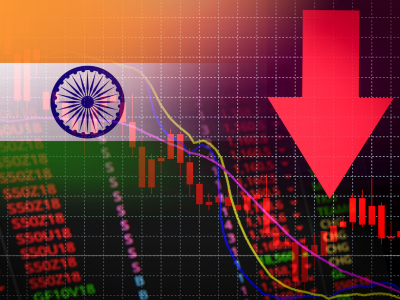Listen to this article
The stock markets have plummeted today. Sensex has trailed by 2,223 points, whereas Nifty tanked by 662 points.
With fears of recession in the US, rising tensions in the middle east and mixed quarter 1 results collectively could be the key reasons for Dalal Street crashing, said market experts.
Dhimant Shah, Head Equity & Senior Fund Manager attributed the dip to Japan’s increasing interest rates for Yen which has affected the money flow globally. He also said, “Another factor which has led to the crash is the valuations, which were way above their long-term averages and this movement has clearly balanced the market out. Lastly, excess supply due to IPOs and NFOs created a shortage of liquidity in the markets.”
Santosh Kumar Singh, Fund Manager, Motilal Oswal MF pointed out that US Fed’s handling of the interest rate cycle hasn’t been in line with the expectations and the effect can be seen in the markets globally. He also advises investors to keep a bottom-up approach at this time as there is no clarity as to where the markets will go.
Aniruddha Naha, CIO - Alternatives, PGIM India MF said, “The global risks associated with the interest cost rise in Japan and an appreciating Yen has led to the unwinding of the carry trade. This will have implications for global equities and is likely to see a rub off for Indian equities as well. Investors need to tone down return expectations and allocate towards equities over the next 9-12 months, hopefully reaping benefits over the next 3 to 5 years.”
Sandeep Bagla, CEO TRUST MF said, "The employment data in US has turned particularly weak, sparking off expectations of a recession like scenario in the US. Stock markets which are linked to the US economy more are witnessing sharper correction. While possibility of a US recession is bad for equity market sentiment in general, and will lead to corrections across equities across the global markets, the markets where the domestic economy is stronger can be expected to rebound faster than others. The Indian economy is likely to be more resilient than other smaller economies and hence investors could look to add at market corrections. At the same time, one must realise that the pace of market performance in the last few years has been unreal and is unlikely to sustain going forward. One must only invest if one has suitably long investment horizon to tide over periods of volatility in the interim. Investors with ability to hold for long term should look to invest over the next few weeks of correction in a systematic manner in pockets where valuations are not stretched. This is likely to be a medium term correction, which will provide long term investment opportunity for the patient investor. One must keep return expectation low in the short term, keep investing systemically over the medium term with an eye to reap benefits from the growth over a long period of time."







